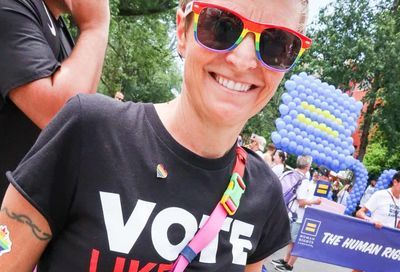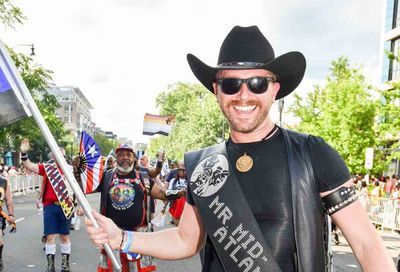Walgreens Pharmacist Refuses to Fill Prescription for Intersex Child
"I'm not going to help you with this," said the Bristol, Virginia pharmacist, as he declined to fill a prescription for an intersex child.

A Walgreens pharmacy manager in Bristol, Virginia, has been accused of refusing to fill a hormone replacement therapy prescription for an intersex child due to his personal beliefs.
A video posted to social media by a TikTok user named Rose Hawley contains audio of Hawley arguing with Collin Jones, the pharmacist in question.
“So this isn’t really about health care, is what you’re saying to me?” Hawley says in the video.
“Look, I’m not going to argue with you… I came to help,” Jones replies.
“You’re not helping,” Hawley says, to which Jones responds, “No, I’m not going to help you with this.”
“You’re not helping,” Hawley repeats, adding, “and you don’t understand the struggle and you don’t understand the situation, so you need to…”
“Sounds like you have some problems that you need to work on,” Jones says, to which Hawley responds, “I don’t have any problems. The problem that I have is that this should be filled. She [the doctor] is licensed in Virginia, so I’m not sure why your Walgreens regulations precede state regulations.”
Jones then raises his voice, accusing Hawley of not listening to him.
“It’s not state, it’s not anything. I personally myself, Collin Jones, will not fill this prescription… and you can do whatever.”
The two then get into a squabble, accusing each other of not listening before Jones ends the conversation, telling Hawley to “have a good day.”
In a follow-up video, Hawley explains that she was picking up the prescription for a “loved one” and didn’t want to “make a big scene” because the child was in the pharmacy with her at the time.
In another video, Hawley says the prescription was for an intersex child.
Hawley also says she was wearing a visible pentacle necklace when she visited the pharmacy, and wondered if the pharmacist reacted badly to the symbol — which, in pagan circles, represents the four elements and inner self, and is supposed to provide protection to the wearer, but is often misinterpreted as a representation of Satanism.
She said that, prior to the start of filming, the pharmacist told her that she had a “chip on her shoulder,” and became visibly hostile towards her.
“I actually came in there simply anticipating getting a prescription filled by a licensed medical professional,” Hawley said. “[His comment about the chip on my shoulder] actually took me aback and from that point on, he was aggressive.”
Hawley called Collins’s refusal to fill the prescription an example of how pharmacists’ personal religious beliefs can impede people from obtaining needed medications.
She discouraged her followers from advocating violence or leaving hateful comments but said she had filed an official complaint with Walgreens and would be filing a complaint with the state pharmacy board.
“Love people,” she urged her followers. “Just love people. Stop being so hateful. Stop being so ugly. Learn to love.”
Interestingly, the fact that the hormone prescription was for an intersex child may potentially highlight a larger issue: lack of awareness of what intersex means and of what constitutes appropriate health care for intersex individuals.
Intersex refers to various conditions where a person’s reproductive or sexual anatomy doesn’t match the “prototypical” anatomy of a male or female individual.
Intersex identity is often confused with transgender identity despite not being the same. Intersex conditions may be treated with medical interventions intended to help a person go through puberty or correct hormone deficiencies.
It remains unclear whether Jones, the pharmacist, understood that the patient for whom the prescription was written was intersex, as opposed to a transgender person, or whether that misunderstanding may have led him to object to filling the prescription.
Even though Virginia does not have a law expressly forbidding minors from obtaining gender-affirming care treatments such as hormone therapy, the issue has received national attention, as 22 states have passed laws restricting minors’ ability to access such treatments.
However, even in states with laws barring access to hormone therapy or surgical interventions, Republican politicians in state legislatures have carved out large exemptions for intersex children, allowing them to receive the treatments that are banned for transgender-identifying minors.
Therefore, even if Virginia were to copy other states and adopt a ban on transgender health care, hormone prescriptions — not to mention surgical interventions — for intersex minors would still be permitted, because such treatments attempt to mold an intersex person’s body in a way that makes them conform to stereotypical assumptions of gender.
But under Virginia law, pharmacists may refuse to fill a prescription for any reason — regardless of whether their opposition is religiously or morally based.
Additionally, Walgreens allows its employees to refuse to fill prescriptions for any reason, including moral and religious convictions. However, they are supposed to refer customers to other pharmacists who will fill it. As a result, there’s little recourse for Hawley other than to file a complaint or to patronize another pharmacy.
This isn’t the first time that Walgreens has made headlines for its pharmacists choosing to exercise their religious objections and imposing those beliefs on customers. In June, a transgender man in Oakland, California, complained on social media that a Walgreens pharmacist had refused to refill his hormone prescription, citing “religious beliefs.”
Last summer, after the Supreme Court overturned the longstanding abortion-rights decision Roe v. Wade, many Walgreens customers complained that some local pharmacists had cited religious or moral beliefs when refusing to fill prescriptions for various medications — not only birth control or the morning-after pill, which prevent pregnancy — but any other drugs that have the potential to cause birth defects or miscarriages, such as treatments for arthritis or stomach ulcers.
According to the Milwaukee Journal-Sentinel, in Hayward, Wisconsin, a Walgreens cashier allegedly refused to sell condoms to a couple because of his personal religious beliefs.
In a separate incident, a TikTok creator claimed a Walgreens pharmacist refused to fill her birth control prescription. The woman who posted the video, Abigail Martin, was later able to get the prescription refilled by a different pharmacist at the same location — who told her that her colleague, who had refused to fill Martin’s prescription, had been denying birth control to several other customers for two weeks.
At the time of the various controversies, Walgreens issued a tweet clarifying its position on religious-based refusals.
“Our policy allows pharmacists to step away from filling a prescription for which they have a moral objection,” Walgreens wrote in its post. “At the same time, they are also required to refer the prescription to another pharmacist or manager on duty to meet the patient’s needs in a timely manner.”
Support Metro Weekly’s Journalism
These are challenging times for news organizations. And yet it’s crucial we stay active and provide vital resources and information to both our local readers and the world. So won’t you please take a moment and consider supporting Metro Weekly with a membership? For as little as $5 a month, you can help ensure Metro Weekly magazine and MetroWeekly.com remain free, viable resources as we provide the best, most diverse, culturally-resonant LGBTQ coverage in both the D.C. region and around the world. Memberships come with exclusive perks and discounts, your own personal digital delivery of each week’s magazine (and an archive), access to our Member's Lounge when it launches this fall, and exclusive members-only items like Metro Weekly Membership Mugs and Tote Bags! Check out all our membership levels here and please join us today!































You must be logged in to post a comment.